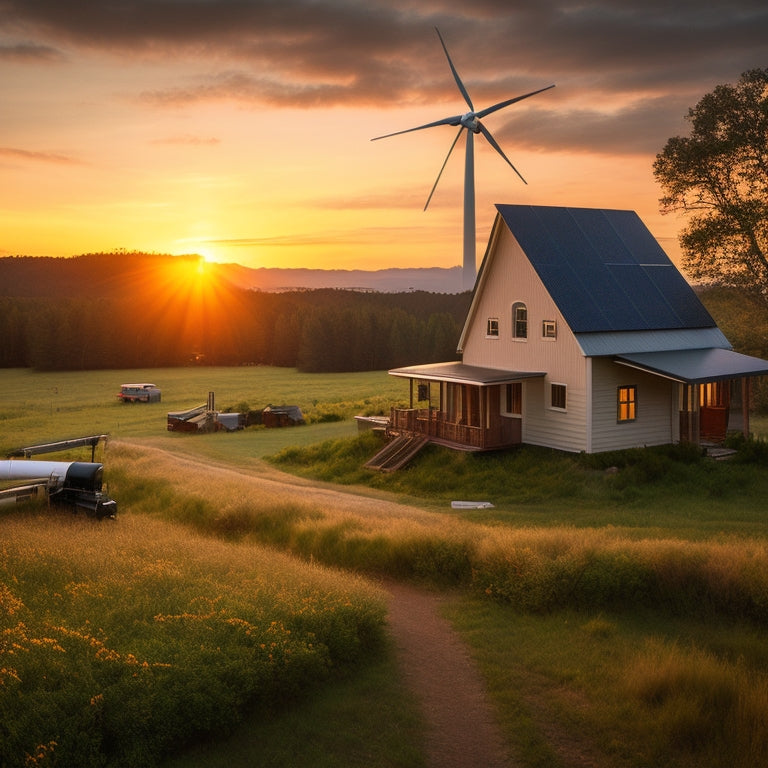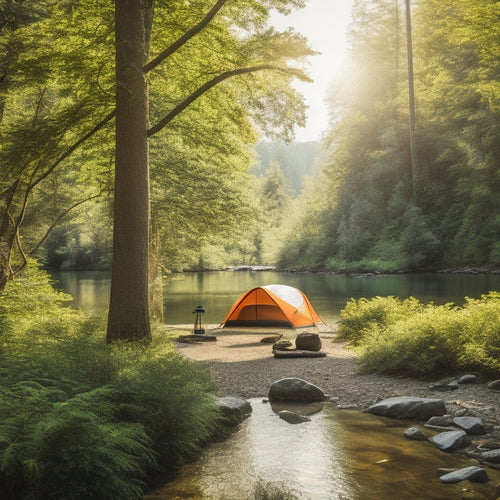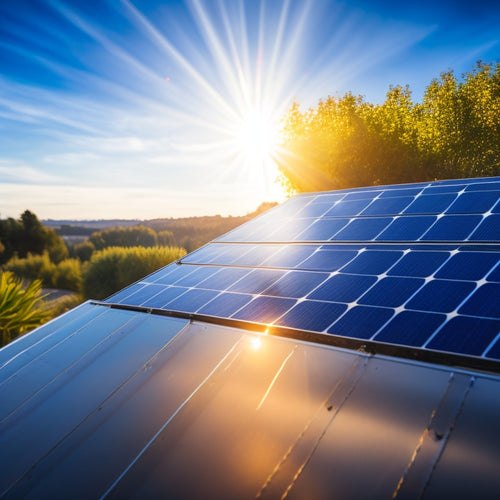
What Powers Your Home Off-Grid Energy Solution?
Share
You're powered by a hybrid system combining solar panels, battery backup systems, inverters, and charge controllers. Your solar panels, likely monocrystalline or polycrystalline, convert sunlight into DC power. This energy is then stored in lithium or lead acid batteries, providing power during low sunlight periods. An inverter, such as a pure sine wave or modified sine wave, converts DC power to AC power for home use. A charge controller regulates energy flow to batteries, ensuring safe charging. As you investigate the complexities of your off-grid energy solution, you'll uncover more about how these components work together to provide reliable, sustainable energy for your home.
Overview
- A well-designed solar panel system harnesses energy from the sun to power your home, with monocrystalline panels offering high efficiency.
- A battery backup system, such as lithium or lead acid batteries, stores excess energy for use during low sunlight periods.
- An inverter converts DC power from solar panels to AC power for home use, with pure sine wave inverters being the most efficient.
- A charge controller regulates energy flow to batteries, ensuring safe charging and preventing overcharging or undercharging.
- Proper installation, including energy auditing and system design, is crucial for a reliable and efficient off-grid energy solution.
DIY Solar Power Essentials
When venturing into DIY solar power, your roof or backyard becomes a potential energy goldmine, ripe for utilizing.
You'll need to understand the basics of solar panel types and energy efficiency to maximize your energy harvest. To guarantee peak energy production, it's vital to evaluate daily energy usage and consider factors like roof orientation, noting that south-facing roofs are ideal for energy output.
Monocrystalline panels boast higher energy efficiency, but come at a higher cost. Polycrystalline panels, on the other hand, offer a more affordable option with slightly lower efficiency.
Energy efficiency is significant, as it directly affects the amount of power you can generate. Look for panels with high energy efficiency ratings to guarantee you're getting the most out of your DIY solar power system.
Choosing the Right Solar Panels
About 300-400 watts of power per panel is a sweet spot for most DIY solar power systems, making it essential to select the right panels for your specific needs.
When choosing solar panels, you'll want to evaluate solar panel efficiency, which is measured by its ability to convert sunlight into electricity. High-efficiency silicon solar cells, for instance, can achieve conversion rates over 26% high-efficiency solar cells, making them suitable for off-grid systems.
Higher efficiency panels are more expensive, but they can generate more power in a smaller space. You'll also need to decide on the type of solar panel: monocrystalline, polycrystalline, or thin-film.
Monocrystalline panels are the most efficient, but also the priciest. Polycrystalline panels offer a good balance of efficiency and cost. Thin-film panels are the most budget-friendly, but less efficient.
Research and compare different options to find the best fit for your off-grid energy solution.
Battery Backup Systems Explained
You've invested in the right solar panels, but what happens when the sun dips below the horizon or during periods of low sunlight? That's where your battery backup system comes in. This energy storage solution guarantees a steady flow of power to your home, even when the sun isn't shining.
By integrating your solar-powered battery backup system with your home's vital infrastructure and essential services, you'll experience enhanced energy autonomy and a reliable power supply. You have two primary options: lithium batteries, known for their high energy density and long lifespan, or lead acid batteries, a more affordable alternative.
Proper battery maintenance is essential to extend their lifespan and optimize performance. Regularly check the charge levels, voltage, and temperature to prevent damage.
Inverters and Charge Controllers
Your battery backup system is only as strong as its weakest link, which is why it's important to pair it with the right inverter and charge controller.
The inverter converts DC power from your batteries to AC power for your home, and there are several types to choose from, including pure sine wave, modified sine wave, and square wave inverters. Each has its advantages and disadvantages, so you'll need to select the one that best fits your specific needs.
Inverter efficiency is significant, as it affects overall system performance, and it's important to verify the inverter matches the battery configuration for optimal performance.
In addition, communication protocols are essential for system integration, so be sure to check manufacturer specifications for compatibility guidelines.
Your charge controller, on the other hand, regulates the flow of energy from your solar panels or wind turbine to your batteries, confirming they're charged safely and efficiently.
Look for features like maximum power point tracking, overcharge protection, and adjustable voltage settings to guarantee your system runs smoothly and reliably.
Installing Your Off-Grid System
As you prepare to install your off-grid energy system, guaranteeing a safe and efficient setup is essential.
A well-designed system requires careful planning and energy auditing to determine your energy needs. A professional assessment will identify areas of energy inefficiency and provide recommendations for improvement.
Your system design should consider factors such as energy usage patterns, battery capacity, and component compatibility. Proper installation is critical to guarantee the system operates at peak levels.
You'll need to confirm that all components are correctly sized, configured, and installed according to manufacturer specifications. Additionally, consider local building codes and regulations to avoid any potential issues.
With a well-planned and executed installation, you'll be on your way to enjoying the freedom and independence of off-grid living.
Frequently Asked Questions
Can I Use an Off-Grid System in a Neighborhood With Utility Power Lines?
You can install an off-grid system in a neighborhood with utility power lines, but you'll need to check neighborhood regulations for off-grid compatibility, ensuring your system meets local standards and doesn't compromise grid reliability.
Do Off-Grid Systems Require Regular Maintenance or Upkeep?
You're like Sarah, who installed an off-grid system in her rural home, guaranteeing energy independence. To guarantee system longevity, you'll perform routine maintenance, like cleaning solar panels quarterly, and schedule annual professional inspections to minimize downtime and optimize performance.
Are Off-Grid Systems Suitable for Homes With High Energy Demands?
You're wondering if off-grid systems can handle high demand homes. The answer is yes, but it requires strategic energy efficiency measures, like optimizing appliances and insulation, to guarantee your system can meet your energy needs without compromise.
Can I Add Wind or Hydro Power to My Off-Grid Energy System?
A million possibilities open up when you consider adding wind or hydro power to your off-grid energy system! You can capture wind energy with turbines or tap into hydro energy with micro-hydroelectric systems, increasing your independence and energy self-sufficiency.
Do Off-Grid Systems Qualify for Government Incentives or Tax Credits?
You'll be happy to know that you're likely eligible for incentive programs and tax credit eligibility on your off-grid energy system, which can greatly reduce your upfront costs and increase your return on investment.
Ready to Buy
You've overcome the first hurdle of going off-grid - understanding the key components of your DIY solar power system. Now, you might be thinking, "But what about cloudy days and nights when my solar panels aren't generating power?" Relax, that's where your battery backup system and inverter come in, ensuring a steady flow of energy to your home. With the right gear and a little know-how, you can enjoy reliable, renewable energy, even when the sun isn't shining.
Related Posts
-

Top Eco-Friendly Camping Equipment for a Sustainable Adventure
When you're camping with the planet in mind, opt for eco-friendly gear like tents made from recycled materials and bi...
-

How to Achieve a Zero-Waste Lifestyle for a Greener Tomorrow
To achieve a zero-waste lifestyle, start by adopting the principles of refusing, reducing, reusing, and recycling. Sw...
-

How Efficient Are Thin Film Solar Cells
Thin film solar cells provide an innovative approach to energy generation, boasting efficiency rates generally betwee...


